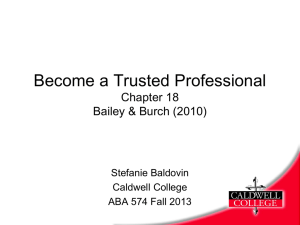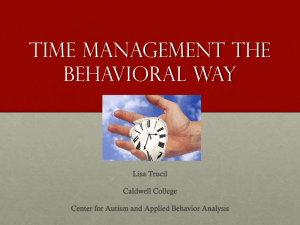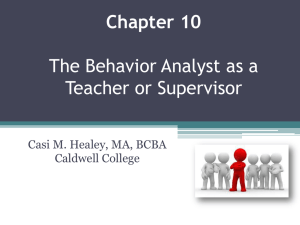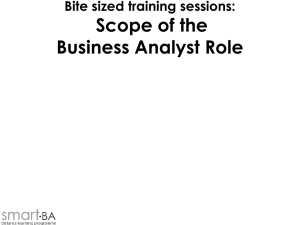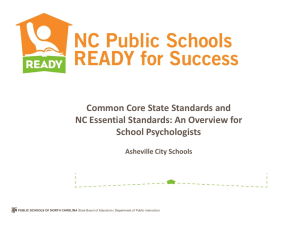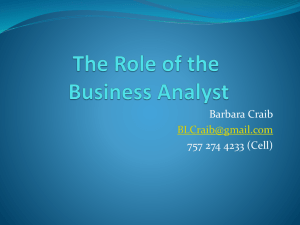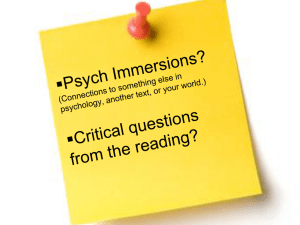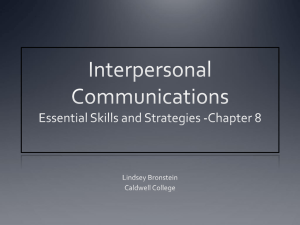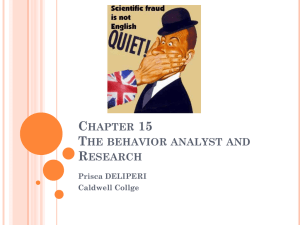Responsible Conduct of a behavior analyst Guideline 1
advertisement
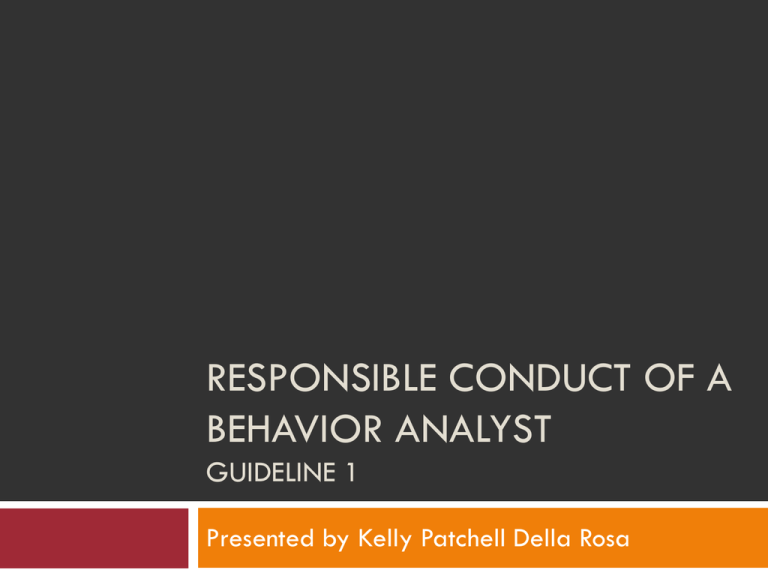
RESPONSIBLE CONDUCT OF A BEHAVIOR ANALYST GUIDELINE 1 Presented by Kelly Patchell Della Rosa Overview Background What is responsible conduct? Guidelines 1.01-1.07 APA Guidelines The Ethics Guy Questions References Background Our beginnings as a field 1960s- experimental analysis of behavior Application of animal lab procedures No guidelines for ethical behavior Why? How did we get here? Sunland Miami Scandal Established guidelines developed (Bailey & Burch, 2011) What is Responsible Conduct? Responsible What are some words that come to mind? Expectations of Behavior Analysts Reliance on scientific knowledge Competence Professional development Integrity Professional/Scientific Relationships Duel Relationships/Conflicts of Interests Exploitative Relationships (Bailey & Burch, 2011) Responsible Conduct of a Behavior Analyst 1.0 Responsible Conduct of a Behavior Analyst. The behavior analyst maintains the high standards of professional behavior of the professional organization. (Bailey & Burch, 2011) Reliance on Scientific Knowledge 1.01 Reliance on Scientific Knowledge. Behavior analysts rely on scientifically and professionally derived knowledge when making scientific or professional judgments in human service provision, or when engaging in scholarly or professional endeavors. (Bailey & Burch, 2011) Reliance on Scientific Knowledge Treatment decisions are based on: Observation Functional behavior assessment Objective data (Bailey & Burch, 2011) Competence 1.02 Competence. (a) Behavior analysts provide services, teach, and conduct research only within the boundaries of their competence, based on their education, training, supervised experience, or appropriate professional experience. (b) Behavior analysts provide services, teach, or conduct research in new areas or involving new techniques only after first undertaking appropriate study, training, supervision, and/or consultation from persons who are competent in those areas or techniques. (Bailey & Burch, 2011) Competence Behavior analysts should only practice in areas in which they have been TRAINED If it is a new area of interest, a behavior analyst must seek out sufficient training Often difficult to know the boundaries Any personal experience with this guideline? (Bailey & Burch, 2011) Professional Development 1.03 Professional Development. Behavior analysts who engage in assessment, therapy, teaching, research, organizational consulting, or other professional activities maintain a reasonable level of awareness of current scientific and professional information in their fields of activity, and undertake ongoing efforts to maintain competence in the skills they use by reading the appropriate literature, attending conferences and conventions, participating in workshops, and/or obtaining Behavior Analyst Certification Board certification. (Bailey & Burch, 2011) Professional Development Stay current! Read the literature and be fluent in your area of expertise Attend conferences and workshops ABAI NJABA APBA (Bailey & Burch, 2011) Integrity 1.04 Integrity. (a) Behavior analysts are truthful and honest. The behavior analyst follows through on obligations and professional commitments with high quality work and refrains from making professional commitments that he/she cannot keep. (b) The behavior analyst’s behavior conforms to the legal and moral codes of the social and professional community of which the behavior analyst is a member. (c) The activity of a behavior analyst falls under these Guidelines only if the activity is part of his or her work-related functions or the activity is behavior analytic in nature. (d) If behavior analysts’ ethical responsibilities conflict with law, behavior analysts make known their commitment to these Guidelines and take steps to resolve the conflict in a responsible manner in accordance with law. (Bailey & Burch, 2011) Integrity Be honest Abilities Timelines Follow through with commitments Be aware of legal, moral, and social issues in the community that you practice Guidelines apply to your job and any area that involves behavior analysis Follow these ethical guidelines to the extent that the law provides Resolve the issue, but don’t break the law! (Bailey & Burch, 2011) Professional & Scientific Relationships 1.05 Professional and Scientific Relationships. (a) Behavior analysts provide behavioral diagnostic, therapeutic, teaching, research, supervisory, consultative, or other behavior analytic services only in the context of a defined, remunerated professional or scientific relationship or role. (b) When behavior analysts provide assessment, evaluation, treatment, counseling, supervision, teaching, consultation, research, or other behavior analytic services to an individual, a group, or an organization, they use language that is fully understandable to the recipient of those services. They provide appropriate information prior to service delivery about the nature of such services and appropriate information later about results and conclusions. (c) Where differences of age, gender, race, ethnicity, national origin, religion, sexual orientation, disability, language, or socioeconomic status significantly affect behavior analysts’ work concerning particular individuals or groups, behavior analysts obtain the training, experience, consultation, or supervision necessary to ensure the competence of their services, or they make appropriate referrals. (Bailey & Burch, 2011) Professional & Scientific Relationships (d) In their work-related activities, behavior analysts do not engage in discrimination against individuals or groups based on age, gender, race, ethnicity, national origin, religion, sexual orientation, disability, socioeconomic status, or any basis proscribed by law. (e) Behavior analysts do not knowingly engage in behavior that is harassing or demeaning to persons with whom they interact in their work based on factors such as those persons’ age, gender, race, ethnicity, national origin, religion, sexual orientation, disability, language, or socioeconomic status, in accordance with law. (f) Behavior analysts recognize that their personal problems and conflicts may interfere with their effectiveness. Behavior analysts refrain from providing services when their personal circumstances may compromise delivering services to the best of their abilities. (Bailey & Burch, 2011) Professional & Scientific Relationships (a) Define your role! Volunteering Written contract What do you think? (b) Use nontechnical language with clients/families Speak clearly Describe all procedures Include the family (c) Individual differences Get training Provide a referral (Bailey & Burch, 2011) Professional & Scientific Relationships (d) Do not discriminate! (e) Be aware of how your behavior affects others Sexual harassment Bullying (f) Monitor your own behavior Consult others Leave of absence Help yourself so you can help others (Bailey & Burch, 2011) Duel Relationships & Conflicts of Interest 1.06 Dual Relationships and Conflicts of Interest. (a) In many communities and situations, it may not be feasible or reasonable for behavior analysts to avoid social or other nonprofessional contacts with persons such as clients, students, supervisees, or research participants. Behavior analysts must always be sensitive to the potential harmful effects of other contacts on their work and on those persons with whom they deal. (b) A behavior analyst refrains from entering into or promising a personal, scientific, professional, financial, or other relationship with any such person if it appears likely that such a relationship reasonably might impair the behavior analyst’s objectivity or otherwise interfere with the behavior analyst’s ability to effectively perform his or her functions as a behavior analyst, or might harm or exploit the other party. (c) If a behavior analyst finds that, due to unforeseen factors, a potentially harmful multiple relationship has arisen (i.e., one in which the reasonable possibility of conflict of interest or undue influence is present), the behavior analyst attempts to resolve it with due regard for the best interests of the affected person and maximal compliance with these Guidelines. (Bailey & Burch, 2011) Duel Relationships & Conflicts of Interest Avoid social contact with clients Interference with objectivity Avoid social contact with supervisees, students, and research participants Objectivity Favoritism Research bias Refrain from forming relationships that may negatively affect performance Scientific, Personal, Financial, Professional Personal examples? Already involved in a duel relationship? Use the guidelines to resolve it immediately (Bailey & Burch, 2011) Duel Relationships Example http://www.youtube.com/watch?v=OArG3MfZ3KE Exploitative Relationships 1.07 Exploitative Relationships. (a) Behavior analysts do not exploit persons over whom they have supervisory, evaluative, or other authority such as students, supervisees, employees, research participants, and clients. (b) Behavior analysts do not engage in sexual relationships with clients, students, or supervisees in training over whom the behavior analyst has evaluative or direct authority, because such relationships easily impair judgment or become exploitative. (c) Behavior analysts are cautioned against bartering with clients because it is often (1) clinically contraindicated, and (2) prone to formation of an exploitative relationship. (Bailey & Burch, 2011) Exploitative Relationships Do not abuse your power over others Sexual relationships Common sense? Maybe not…. Bartering Exchange of goods/services in place of payment Cautioned against because of issues over equality of exchange Example: Jamaica trip (Bailey & Burch, 2011) APA Guidelines Where do the BACB and APA line up on ethical issues? Reliance on Scientific Knowledge 2.04 Bases for Scientific and Professional Judgments Psychologists' work is based upon established scientific and professional knowledge of the discipline. 9.01 Bases for Assessments (a) Psychologists base the opinions contained in their recommendations, reports and diagnostic or evaluative statements, including forensic testimony, on information and techniques sufficient to substantiate their findings. (b) Except as noted in 9.01c, psychologists provide opinions of the psychological characteristics of individuals only after they have conducted an examination of the individuals adequate to support their statements or conclusions. When, despite reasonable efforts, such an examination is not practical, psychologists document the efforts they made and the result of those efforts, clarify the probable impact of their limited information on the reliability and validity of their opinions and appropriately limit the nature and extent of their conclusions or recommendations. (c) When psychologists conduct a record review or provide consultation or supervision and an individual examination is not warranted or necessary for the opinion, psychologists explain this and the sources of information on which they based their conclusions and recommendations. (American Psychological Association, 2002) APA Guidelines Professional Development 2.03 Maintaining Competence Psychologists undertake ongoing efforts to develop and maintain their competence. Competence 2.01 Boundaries of Competence (a) Psychologists provide services, teach and conduct research with populations and in areas only within the boundaries of their competence, based on their education, training, supervised experience, consultation, study or professional experience. (c) Psychologists planning to provide services, teach or conduct research involving populations, areas, techniques or technologies new to them undertake relevant education, training, supervised experience, consultation or study. Integrity 1.02 Conflicts Between Ethics and Law, Regulations, or Other Governing Legal Authority If psychologists’ ethical responsibilities conflict with law, regulations or other governing legal authority, psychologists clarify the nature of the conflict, make known their commitment to the Ethics Code and take reasonable steps to resolve the conflict consistent with the General Principles and Ethical Standards of the Ethics Code. Under no circumstances may this standard be used to justify or defend violating human rights. 1.03 Conflicts Between Ethics and Organizational Demands If the demands of an organization with which psychologists are affiliated or for whom they are working are in conflict with this Ethics Code, psychologists clarify the nature of the conflict, make known their commitment to the Ethics Code and take reasonable steps to resolve the conflict consistent with the General Principles and Ethical Standards of the Ethics Code. Under no circumstances may this standard be used to justify or defend violating human rights. (American Psychological Association, 2002) APA Guidelines Professional & Scientific Relationships 3.01 Unfair Discrimination In their work-related activities, psychologists do not engage in unfair discrimination based on age, gender, gender identity, race, ethnicity, culture, national origin, religion, sexual orientation, disability, socioeconomic status or any basis proscribed by law. 3.02 Sexual Harassment Psychologists do not engage in sexual harassment. Sexual harassment is sexual solicitation, physical advances or verbal or nonverbal conduct that is sexual in nature, that occurs in connection with the psychologist's activities or roles as a psychologist and that either (1) is unwelcome, is offensive or creates a hostile workplace or educational environment, and the psychologist knows or is told this or (2) is sufficiently severe or intense to be abusive to a reasonable person in the context. Sexual harassment can consist of a single intense or severe act or of multiple persistent or pervasive acts. 3.03 Other Harassment Psychologists do not knowingly engage in behavior that is harassing or demeaning to persons with whom they interact in their work based on factors such as those persons' age, gender, gender identity, race, ethnicity, culture, national origin, religion, sexual orientation, disability, language or socioeconomic status. (American Psychological Association, 2002) APA Guidelines Duel Relationships/Conflicts of Interest 3.05 Multiple Relationships (a) A multiple relationship occurs when a psychologist is in a professional role with a person and (1) at the same time is in another role with the same person, (2) at the same time is in a relationship with a person closely associated with or related to the person with whom the psychologist has the professional relationship, or (3) promises to enter into another relationship in the future with the person or a person closely associated with or related to the person. A psychologist refrains from entering into a multiple relationship if the multiple relationship could reasonably be expected to impair the psychologist's objectivity, competence or effectiveness in performing his or her functions as a psychologist, or otherwise risks exploitation or harm to the person with whom the professional relationship exists. Multiple relationships that would not reasonably be expected to cause impairment or risk exploitation or harm are not unethical. (b) If a psychologist finds that, due to unforeseen factors, a potentially harmful multiple relationship has arisen, the psychologist takes reasonable steps to resolve it with due regard for the best interests of the affected person and maximal compliance with the Ethics Code. 3.06 Conflict of Interest Psychologists refrain from taking on a professional role when personal, scientific, professional, legal, financial or other interests or relationships could reasonably be expected to (1) impair their objectivity, competence or effectiveness in performing their functions as psychologists or (2) expose the person or organization with whom the professional relationship exists to harm or exploitation (American Psychological Association, 2002) APA Guidelines Exploitative Relationships 3.08 Exploitative Relationships Psychologists do not exploit persons over whom they have supervisory, evaluative or other authority such as clients/patients, students, supervisees, research participants and employees. 10.05 Sexual Intimacies with Current Therapy Clients/Patients Psychologists do not engage in sexual intimacies with current therapy clients/patients. 10.06 Sexual Intimacies with Relatives or Significant Others of Current Therapy Clients/Patients Psychologists do not engage in sexual intimacies with individuals they know to be close relatives, guardians, or significant others of current clients/patients. Psychologists do not terminate therapy to circumvent this standard. 10.08 Sexual Intimacies with Former Therapy Clients/Patients (a) Psychologists do not engage in sexual intimacies with former clients/patients for at least two years after cessation or termination of therapy. The Ethics Guy Bruce Weinstein, Ph.D. Ph.D. from Georgetown Clients include NFL, Johnson & Johnson, and The National Guard Ethics analyst for CNN www.theethicsguy.com http://www.youtube.com/watch?v=Lhwhgf01Ozw Questions??? THANK YOU! References American Psychological Association. (2002). American Psychological Association ethical principles of psychologists and code of conduct. http://www.apa.org/ethics/code2002.html Bailey, J., & Burch, M. (2011). Ethics for Behavior Analysts (2nd ed.). New York: Routledge.
